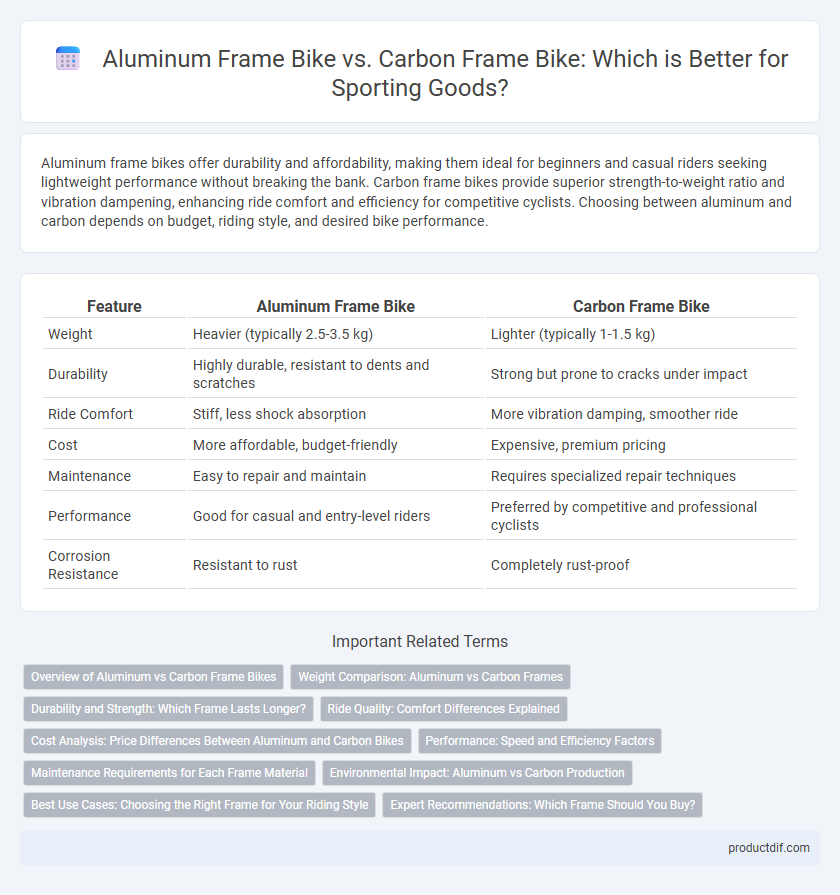Aluminum frame bikes offer durability and affordability, making them ideal for beginners and casual riders seeking lightweight performance without breaking the bank. Carbon frame bikes provide superior strength-to-weight ratio and vibration dampening, enhancing ride comfort and efficiency for competitive cyclists. Choosing between aluminum and carbon depends on budget, riding style, and desired bike performance.
Table of Comparison
| Feature | Aluminum Frame Bike | Carbon Frame Bike |
|---|---|---|
| Weight | Heavier (typically 2.5-3.5 kg) | Lighter (typically 1-1.5 kg) |
| Durability | Highly durable, resistant to dents and scratches | Strong but prone to cracks under impact |
| Ride Comfort | Stiff, less shock absorption | More vibration damping, smoother ride |
| Cost | More affordable, budget-friendly | Expensive, premium pricing |
| Maintenance | Easy to repair and maintain | Requires specialized repair techniques |
| Performance | Good for casual and entry-level riders | Preferred by competitive and professional cyclists |
| Corrosion Resistance | Resistant to rust | Completely rust-proof |
Overview of Aluminum vs Carbon Frame Bikes
Aluminum frame bikes offer durability and affordability, making them ideal for beginners and casual riders seeking a lightweight yet sturdy option. Carbon frame bikes excel in performance with superior strength-to-weight ratios, vibration damping, and aerodynamic designs favored by competitive cyclists and enthusiasts. The choice between aluminum and carbon frames depends on budget, ride quality preferences, and intended use, with carbon typically preferred for high-end racing and aluminum for versatile, cost-effective cycling.
Weight Comparison: Aluminum vs Carbon Frames
Aluminum frame bikes typically weigh between 2.5 to 3.5 kilograms, making them heavier than carbon frame bikes, which usually range from 1.0 to 1.5 kilograms. The lighter weight of carbon frames enhances acceleration, climbing efficiency, and overall handling, crucial for competitive cycling. Despite aluminum's durability and cost-effectiveness, carbon fiber offers superior weight-to-strength ratios, making it the preferred choice for performance-focused riders.
Durability and Strength: Which Frame Lasts Longer?
Aluminum frame bikes offer strong resistance to impact and corrosion, making them highly durable for everyday riding and rough conditions. Carbon frame bikes excel in strength-to-weight ratio but are more susceptible to damage from sharp impacts and stress fractures over time. Aluminum frames typically last longer due to their robust structure and easier repairability compared to the delicate nature of carbon composites.
Ride Quality: Comfort Differences Explained
Aluminum frame bikes offer a stiffer ride, which can translate to more energy transfer but may result in increased road vibrations and reduced comfort on rough terrain. Carbon frame bikes excel in vibration damping due to the composite's natural flex, providing a smoother and more comfortable ride, especially over long distances. Riders prioritizing comfort and reduced fatigue often prefer carbon frames, while those seeking durability and cost-effectiveness may opt for aluminum frames despite the trade-off in ride quality.
Cost Analysis: Price Differences Between Aluminum and Carbon Bikes
Aluminum frame bikes generally cost between $300 and $1,000, making them a budget-friendly option for casual riders and beginners. Carbon frame bikes, priced from $1,500 to over $10,000, offer superior lightweight strength but involve a significant investment. The price difference reflects disparities in material costs, manufacturing complexity, and performance benefits.
Performance: Speed and Efficiency Factors
Aluminum frame bikes offer lightweight durability and responsive handling, enhancing acceleration and climbing efficiency, making them ideal for riders seeking speed without sacrificing rigidity. Carbon frame bikes provide superior vibration dampening and aerodynamic advantages, optimizing power transfer and reducing fatigue during long rides for maximum speed and efficiency. Both materials influence ride performance, with carbon excelling in energy conservation and aluminum prioritizing strength-to-weight balance.
Maintenance Requirements for Each Frame Material
Aluminum frame bikes require less frequent maintenance due to their durability and resistance to corrosion, making them ideal for riders who prefer low upkeep. Carbon frame bikes demand more careful handling and regular inspections for cracks or damage, as their composite structure is more susceptible to stress-related wear. Proper maintenance for carbon frames involves specialized cleaning products and repairs, which can be costlier compared to aluminum frames.
Environmental Impact: Aluminum vs Carbon Production
Aluminum frame bikes generate higher energy consumption and greenhouse gas emissions during production compared to carbon frame bikes, yet aluminum is more recyclable, reducing its overall environmental footprint. Carbon fiber production involves energy-intensive processes and difficulty in recycling, leading to long-term waste challenges. Choosing aluminum frames supports circular economy principles through efficient material recovery and reuse.
Best Use Cases: Choosing the Right Frame for Your Riding Style
Aluminum frame bikes are best suited for riders seeking durability and affordability, excelling in urban commuting and casual riding due to their lightweight and resistance to corrosion. Carbon frame bikes provide superior vibration dampening and stiffness, ideal for competitive cyclists and long-distance riders aiming for enhanced performance and reduced fatigue. Matching the frame material to your riding style ensures optimal comfort, efficiency, and handling based on terrain and intensity.
Expert Recommendations: Which Frame Should You Buy?
Experts recommend choosing an aluminum frame bike for durability, affordability, and stiffness, making it ideal for beginners and casual riders. Carbon frame bikes offer superior lightweight performance and vibration absorption, preferred by competitive cyclists prioritizing speed and comfort. Consider riding style, budget, and long-term goals to determine whether aluminum's reliability or carbon's advanced engineering best suits your needs.
Aluminum Frame Bike vs Carbon Frame Bike Infographic

 productdif.com
productdif.com